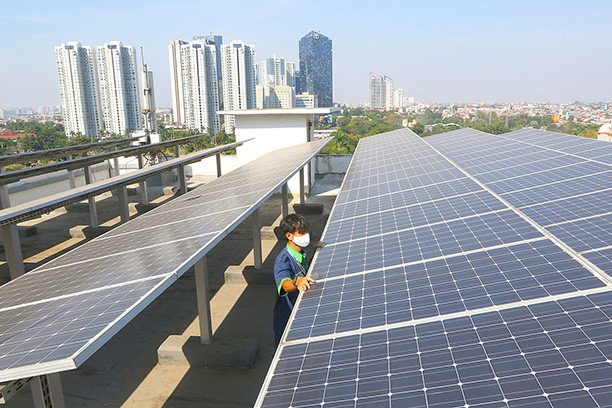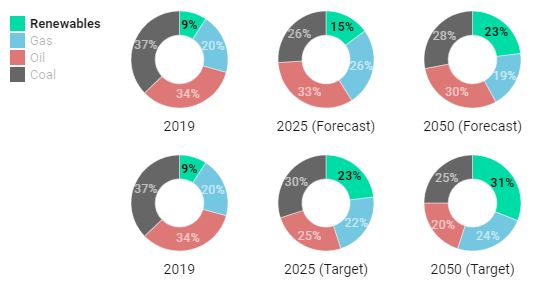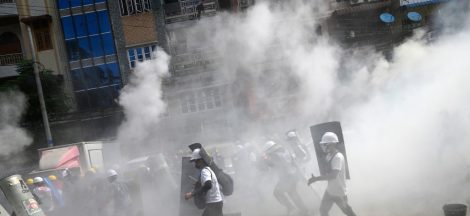RI to break long-term green energy promises at current pace. If progress continues as it has, renewable sources will provide 15 percent of Indonesia’s energy mix by 2025, well below the country’s 23 percent target for that year, according to the Institute for Essential Services Reform (IESR).

A recent study by the institute predicted that in such a business-as-usual situation, renewable energy would make up only 23 percent of the country’s energy consumption by 2050. The National General Energy Planning (RUEN) road map stipulates that green energy should make up 31 percent of the mix by that year.
The IESR has urged the government to revise the RUEN’s “disproportional” targets. IESR researcher Agus Tampubolon said they were based on incorrect economic assumptions in a statement on Wednesday.
At the current pace, renewable sources will provide 15 percent of Indonesia’s energy by 2025, well short of the targeted 23 percent

The study adds to a growing body of evidence that Indonesia’s energy transition is moving too slowly and that without major policy changes, the country will miss its long-term green energy commitments. Regulations stipulate that Indonesia should have reached 17.5 percent renewable energy by 2019, but only 12.36 percent of the country’s energy use that year came from renewable sources.
The forecasts highlight the country’s reliance on conventional fossil fuels, reflected in a number of government policies, such as caps on fossil fuel prices and purchase guarantees for coal plants.
The National Energy Board (DEN), which oversees the RUEN, estimates that Indonesia’s green energy mix, expressed in million tons of oil equivalent (mtoe), was 9.15 percent last year, markedly higher than the 4.4 percent in 2015, when the road map was instated.
However, the DEN forecasts that only 21 percent of the country’s energy consumption will be from renewables by 2025. The Agency for the Assessment and Application of Technology (BPPT) predicts just 13 percent.
“We have many scenarios, but we can’t just put out a new vision,” said DEN policy head Sugeng Mujiyanto on Tuesday in defense of the existing targets.
The government policy emphasizes the use of bioenergy, particularly palm oil-mixed biodiesel, to meet RUEN targets. This year, the government escalated Indonesia’s mandatory biodiesel blend from 20 percent to 30 percent.
Mandating the use of pure biodiesel (B100) starting in 2030, replacing half of all cars with electric cars by 2050 and connecting half of all urban homes to gas pipes by 2050 would cause renewable sources to make up 40 percent of the country’s energy mix by 2050, exceeding the RUEN target, the IESR study found.
President Joko “Jokowi” Widodo and his ministers have announced grand plans to that effect, starting with the mandatory use of B40 next year, but associations and experts have raised concerns over mounting hurdles.
“I think B40 can only start from 2022 onwards because Pertamina and other businessmen have said they need more time to build refineries,” said Indonesian Palm Oil Association (Gapki) secretary-general Togar Sitanggang on Monday at a webinar hosted by Bimasena.
The Energy and Mineral Resources Ministry was making “extraordinary efforts” to push renewables in the power industry, said Sutijastoto, the ministry’s renewable energy director general, during Monday’s webinar.
He mentioned the drafting of a regulation on green electricity prices and a green energy law that would “level the playing field” between renewable and nonrenewable energy industries. In August, the International Energy Agency (IEA) urged the government to make key regulatory reforms to open access to investment in renewables, including by issuing a Presidential Regulation on green energy pricing to enable more privately owned renewable energy companies to enter the domestic market.
The IESR study offered a best-case scenario where the government phased out coal-fired power plants, causing the renewables mix to rise to 69 percent by 2050.
Under such a scenario, the government would ban the construction of new coal plants starting in 2025, would decommission those over 30 years old and would successfully execute a plan to swap out fossil-fuel power plants with green energy plants. However, the Energy Ministry unveiled a four-year road map last month to set aside increasing amounts of locally mined coal for coal plants until 2024. RI to break long-term green energy promises at current pace: IESR (Norman Harsono, The Jakarta Post)





 Public Works Ministry Offers Private Firms Rp21.7t Worth of Road, Bridge Projects
Public Works Ministry Offers Private Firms Rp21.7t Worth of Road, Bridge Projects 